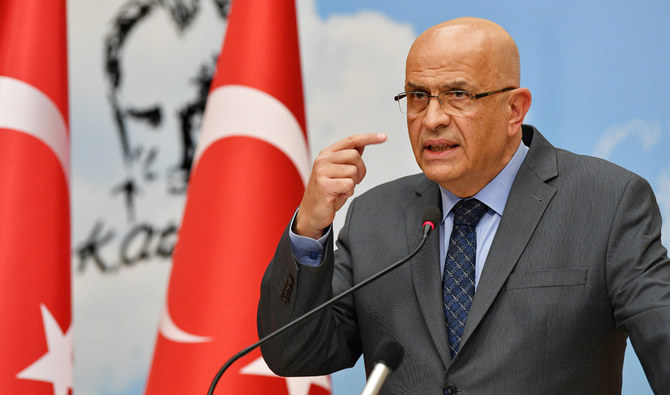ISTANBUL: Three opposition MPs in Turkey were expelled from office on Thursday night and detained on espionage and terrorism charges in a move many see as being designed to weaken opposition parties ahead of a likely snap election.
Enis Berberoglu, from the main opposition Republican People’s party (CHP), and Leyla Guven and Musa Farisiogullari from the pro-Kurdish Peoples’ Democratic Party (HDP) were all expelled, thus losing their parliamentary immunity. Berberoglu was arrested at his home in Istanbul during the night, while the two HDP MPs were arrested in the southeastern city of Diyarbakir.
Opposition MPs reportedly chanted slogans calling the ruling government fascist, “putschist,” and “the enemy of democracy.”
“This is yet another sign that the Islamist-nationalist coalition ruling President Recep Tayyip Erdogan’s presidency will harden its authoritarianism as it continues to lose democratic legitimacy,” Murat Somer, a political scientist from Koc University in Istanbul, told Arab News. “It tries to kill three birds with one stone.”
CHP MP Berberoglu, a journalist, was sentenced to five years and 10 months in prison in 2018 for providing another journalist with footage that appeared to show that the National Intelligence Agency was providing arms to Syrian rebels in 2014. His sentence was on hold because of his parliamentary immunity.
The HDP parliamentarians have been charged with “membership of a terrorist organization” because of their alleged links to the outlawed Kurdistan Workers’ Party (PKK). Earlier this week, the HDP asked for an official probe into the cost of Turkey’s involvement in the Libyan conflict and urged the government to focus on dealing with domestic issues.
The government’s increasing crackdown on opposition parties is a result of its waning power domestically — where it faces an unprecedented economic crisis and rising unemployment — Somer and others suggest.
FASTFACT
Enis Berberoglu, from the main opposition Republican People’s party (CHP), and Leyla Guven and Musa Farisogullari from the pro-Kurdish Peoples’ Democratic Party (HDP) were all expelled, thus losing their parliamentary immunity.
According to Somer, the latest arrests are not only an attempt to restrict democratic opposition by criminalizing it but also to drive a wedge between pro-Kurdish opposition parties and the rest. They are also a warning to potential dissidents inside the ruling Justice and Development Party (AKP).
“All this is yet another step in the ongoing struggle between those who want to consolidate an authoritarian presidential system and a still-divided yet dynamic opposition (aiming) to revive democracy,” he said.
The crackdown on the HDP is expected to push the pro-Kurdish party to adopt a more radical standpoint that could make any electoral alliance difficult to sell to CHP voters.
Alpay Antmen, an attorney and a CHP MP, said the arrests are intended to shift people’s focus away from Turkey’s economic turmoil and the fallout from the COVID-19 pandemic. Members of the main opposition party were about to launch a campaign across 19 of Turkey’s hardest-hit cities to listen to the views of local citizens.
“The ruling government tries to restrict the opposition parties’ efforts to reach out to the citizens and to help them recover (financially). But whatever they do, it gives us further enthusiasm for our nationwide projects,” Antmen told Arab News.
Director of Human Rights Watch Turkey Emma Sinclair-Webb also criticized the move, describing it as “another sign of the relentless assault on elected opposition parties,” and added that the three lawmakers had been subjected to “politically motivated trials in which legal activities were criminalized.”


























